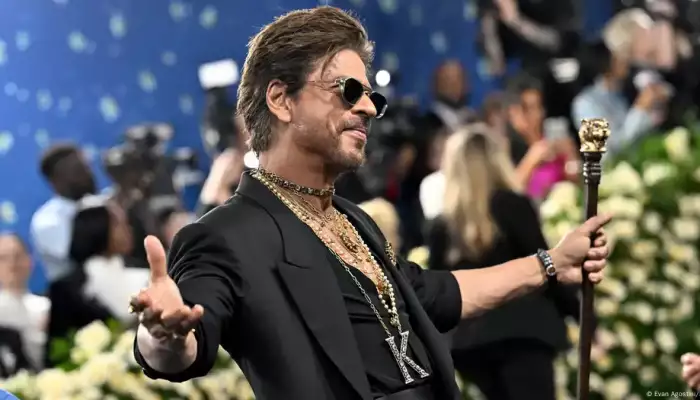
Gen Z remixes him. Millennials grew up with him. Boomers watched him rise.
For millions of people within and outside India, Shah Rukh Khan (aka SRK) remains one of the most recognizable and resonant icons of the Hindi film industry.
This year alone, the actor, who turns 60 on November 2, notched several viral moments: In May he became the first Indian male actor to walk the Met Gala red carpet , in June he did a cameo in Ed Sheeran's "Sapphire" video, and in October he went viral for a selfie taken in Riyadh with South Korean "Squid Game" star Lee Jung-jae — an image that some fans called the "collab of the century."
Google Trends searches on him span Mauritius to Myanmar. So what is it about his myth that transcends time, platforms and countries?
The man behind the myth
Since his 1992 debut, Khan has played a wide range of roles in more than 80 films: the romantic idol in "Dilwale Dulhania Le Jayenge" (1995), which still runs at one Mumbai cinema; a disgraced hockey coach seeking redemption in "Chak De! India" (2007); and a vigilante fighting government inefficiency and corruption in "Jawan" (2023) — in which he plays six avatars, each echoing earlier film personas. The latter won him his first-ever Indian National Film Award for best actor in September.
Vera Wessel, chief editor of the German-language Bollywood-focused magazine Ishq, said SRK could evoke emotions like no other actor — "even his fans sometimes struggle to explain why he has this effect on them."
SRK once quipped to US television host David Letterman: "I'm an employee of the myth of Shah Rukh Khan."
Through the fans' lens
The female gaze upon his myth was deftly covered by economist (and SRK fan) Shrayana Bhattacharya in her 2021 book, "Desperately Seeking Shah Rukh: India's Lonely Young Women and the Search for Intimacy and Independence." Using Khan as a "narrative device," she got Indian women of diverse ages and social strata "to talk about their own frustrated attempts to assert economic and emotional independence in one of world's most insidious patriarchies."
Bhattacharya posits that Khan's image is refracted through the realities of the people who watch him on the screen. For a migrant tribal domestic worker, his onscreen gestures of care — helping with domestic chores, inhabiting feminized domains — offer rare validation in a country where men's participation in care labor ranks among the lowest globally. For elites, he embodied the myth of meritocracy during India's neoliberal pivot. And for first-generation women professionals, his films provided emotional relief from their quiet rebellion of choosing career over marriage.
"Following the lives, livelihoods and love affairs of his female fans for 15 years, I know there is no linear thesis on Khan's icon," Bhattacharya told DW. "He is one person, but each fan has projected their aspirations and fantasies onto him in their own unique and deeply diverse ways."
Remixed by Gen Z
Not unlike the loyal fan bases of '90s boy bands, many of Khan's fans have journeyed and matured with him, sometimes passing on the "bug" to their offspring. His films portraying the lives of Indians who live abroad also struck a chord with the vast Indian diaspora, estimated at 35 million people, and in the process introduced non-Indian fans to Hindi cinema .
"With India being the most populous country in the world and a huge market, I don't think Khan even needs to make efforts to extend his stardom," Wessel said.
Referring to Khan's cameo in Sheeran's "Sapphire" video, Wessel said: "I'm pretty sure people like Ed Sheeran getting to know him and now also working with him is not just natural, but smart of them, not the other way around."
Khan does seem to be vibing effortlessly with Gen Z, inspiring mashups, memes and TikToks. These often involve the songs he performs in his films, which he lip-synchs — as is typical in many Indian films — while emoting with his trademark outstretched arms move and expressive eyes.
Canadian Indian rapper Tesher's 2020 track "Young Shahrukh," which sampled a song from Khan's hit 2001 film, "Kabhi Khushi Kabhie Gham," has more than 20 million views on YouTube. Khan himself has grooved to the tune on several occasions.
Similarly, British singer Dua Lipa's 2020 hit "Levitating" was mashed with "Wo Ladki Jo," a hit from Khan's 1999 film, "Baadshah." Lipa performed this version at a Mumbai gig last year, complete with the film's dance steps, sending fans into a frenzy. Among them was Khan's daughter Suhana, also an actress now, who posted an Instagram story of the moment, complete with heart-eye emojis.
Timeless icon
Wessel attributes SRK's continued relevance to his business acumen, saying he was among the first Indian stars who successfully engaged online with their fans. His work endorsing big brands, some of which he spotlights to his 48.8. million Instagram followers, has given him continued commercial success along with a strong voice.
"And, whenever he uses that voice, be it in his films or public appearances, he tends to spread a message of hope and understanding, delivered with simple words and tongue-in-cheek humor," Wessel said.
Wessel said Khan would likely remain front and center in future films — "because trends come and go, but his popularity seems to remain timeless."